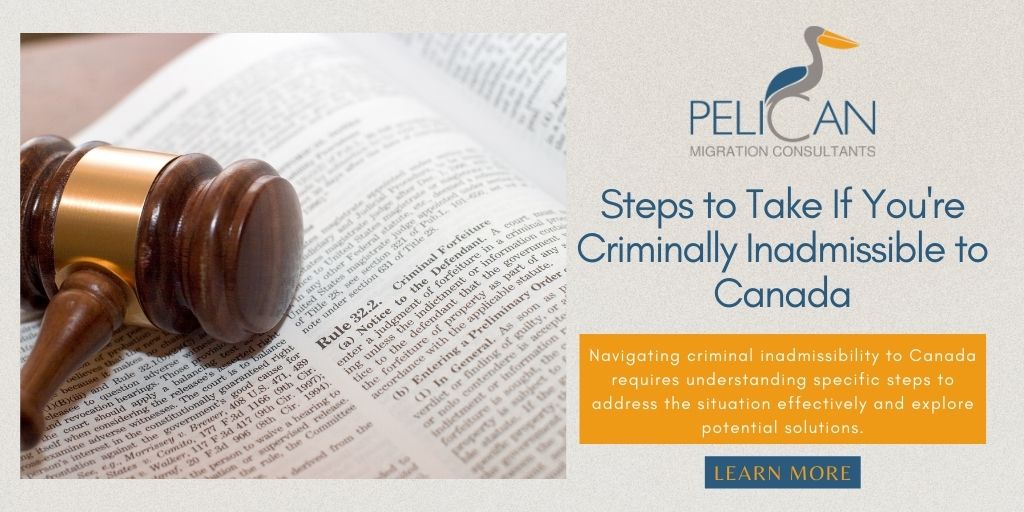
Many travelers to Canada are often caught off guard by the consequences of minor offenses, like driving under the influence (DUI), which can lead to being denied entry due to 'criminal inadmissibility'. Whether you're visiting briefly or considering permanent immigration, it's crucial to grasp the implications and your options if deemed inadmissible.
Navigating Criminal Inadmissibility in Canada
Generally, individuals seeking temporary residency or applying for Canadian permanent residence may face criminal inadmissibility if they meet any of the following criteria:
- Has been convicted of an offense within Canada.
- Has been convicted of an offense outside Canada that equates to a crime under Canadian law.
- Committed an act abroad that is deemed criminal under local laws and would be punishable under Canadian law.
Foreign nationals from countries that require a visa to enter Canada must submit an application in advance for a visa or permit. During this process, they are required to disclose any criminal history they may have.
Foreign nationals from countries that do not require a visa to enter Canada are subject to entry at the discretion of a Canadian Border Services Agency (CBSA) officer at a Port of Entry (POE). Due to international information sharing on criminal convictions for national security purposes, CBSA officers may deny entry to individuals who are found to be criminally inadmissible.
Canadian permanent residence applicants are required to obtain police clearance certificates from every country where they have lived for 6 months or longer. Additionally, applicants must disclose any convictions, sentences, detentions, and arrests in their application, and may need to provide additional information as requested by the assessing officer.
If someone is found criminally inadmissible when attempting to enter Canada or applying for Canadian permanent residence, they will likely face denial. However, there are procedures in place that may allow individuals to overcome criminal inadmissibility under certain circumstances.
Overcoming Criminal Inadmissibility: Criminal Rehabilitation in Canada
Foreign nationals who face criminal inadmissibility to Canada can potentially overcome this status through criminal rehabilitation. This process involves demonstrating a stable lifestyle and low risk of future criminal activity. There are two pathways to achieve rehabilitation:
- Officially applying for rehabilitation through the Canadian immigration authorities.
- Automatic deemed rehabilitation if at least 10 years have passed since completing the sentence or since the commission of the offense, for offenses that could lead to a maximum 10-year sentence under Canadian law.
Please note that convictions and offenses occurring within Canada cannot be addressed through criminal rehabilitation. Instead, individuals in this category may seek a record suspension from the Parole Board of Canada to overcome criminal inadmissibility.
Seeking Criminal Rehabilitation in Canada
If you are deemed criminally inadmissible to Canada, you may qualify to apply for criminal rehabilitation.
To be eligible, a minimum of five years must have elapsed since completing your sentence or, if no sentence was given, since the offence occurred. For instance, if your driver’s license was suspended due to a DUI charge, you must wait five years from the date of its reinstatement before applying for rehabilitation.
Applying for criminal rehabilitation involves filling out specific forms available on the IRCC website. You'll need to submit court documentation for your offence(s), proof of rehabilitation, and police clearance certificates. The processing time for criminal rehabilitation can be up to 24 months, so it's advisable to apply well ahead of any planned trips to Canada.
If it's been fewer than five years since your sentence was completed, you may still overcome criminal inadmissibility by applying for a Temporary Resident Permit (TRP).
Overcoming Criminal Inadmissibility: Temporary Resident Permit (TRP)
If someone is deemed criminally inadmissible to Canada but isn't eligible for rehabilitation yet, they can apply for a temporary resident permit (TRP). This permit allows them special permission to enter Canada for specified durations despite their inadmissibility.
Note: A TRP is distinct from a temporary resident visa (TRV). While all temporary residents entering Canada as visitors, students, or workers typically need a TRV, individuals who are criminally inadmissible must obtain a TRP for permission to enter Canada.
Seeking a Temporary Resident Permit (TRP)
To apply for a Temporary Resident Permit (TRP), there are no rigid eligibility criteria. However, TRPs for those deemed criminally inadmissible to Canada are granted based on the discretion of the immigration officer handling the application. The decision hinges on the applicant's ability to convince the officer, typically requiring them to demonstrate:
- A valid reason (or reasons) for visiting or staying in Canada.
- A demonstration that your need to enter or remain in Canada outweighs any potential risks to Canadian society.
If you are visa-exempt, you can apply for a TRP through the appropriate visa office for your country or region, each with its own specific application process.
If you need a visa to enter Canada, you can provide supporting documents explaining your inadmissibility and why it might be justified for you to enter Canada along with your temporary resident visa (TRV) application.
If you want to check your eligibility for Canadian immigration, just complete a free online assessment, and someone from Pelican Migration team will reach out to discuss your options with you.
Navigating Canadian Immigration: Your Path to Success with Pelican Migration Consultant
Pelican Migration Consultants are committed to ensuring that every step of your Canadian immigration journey is handled with expertise and dedication. They specialize in assessing eligibility, meticulously preparing applications, and offering continuous support and representation. With a focus on personalized assistance, their legal team tailors strategies to fit your individual circumstances. Whether you're pursuing temporary entry with a TRP or aiming for permanent residency through skilled worker programs or family sponsorship, Pelican Migration Consultants are dedicated to helping you navigate the process with confidence and success.


